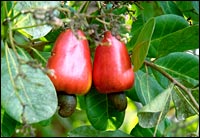Dear Umbra,
I work in a grocery store. Recently a customer refused to purchase our cashews because they weren’t organic. Does it really matter if nuts are organic? Are they sprayed with chemicals during production? Did the customer have a point, or should she have sucked it up and bought our cashews?
Brianna
Farmington Hills, Mich.
Dearest Brianna,
I am shocked, shocked to find that the bland, chewy cashew is the most popular nut in the world.

A cashew tree in Brazil.
Photo: iStockphoto.
Cashews are related to mangoes and poison oak. They grow on large mango-esque trees, which produce at least three usable products: the nut, an adjoining “apple” — which looks like a sweet red pepper — and a liquid that’s used in brake linings and epoxy (really!). The apple is apparently a hot item in parts of India, a major cashew-producing country. Other major producers are Vietnam, Nigeria, and Brazil, from which the tree originates. (The poison oak connection does have a little relevance, because processing cashew products can give a rash, and eating poorly processed nuts can also make us ill. But this rarely happens, and is unrelated to chemical spray.)
A lot of cashew production is on small, often wild or naturalized plantations that don’t use many fertilizers or pesticides. There is a small use of pesticides in the general industry, including the infamous DDT, and there is also certified organic cashew production. After looking around a bit, however, I would say that cashews are not the No. 1 conventionally grown nut to avoid.
Which begs the question, are there conventional nuts to avoid? If you need nuts and only have access to conventional nuts, should you purchase or shun? Will you hurt yourself or the earth by buying conventional nuts? What about Venus? Will Venus be harmed? (Venus is already totally messed up, what with the intense greenhouse effect and the high temperatures on the planet surface, so I think it’s a lost cause.)
Oh, I’m just biding my time here because it’s difficult to answer your question. When it comes to pesticides in general, we can look to projects such as the Environmental Working Group’s food priority report card for guidance. EWG has a lovely wallet card [PDF] of fruits and vegetables with high and low pesticide residues, but no nuts on the list. (The FDA also assesses pesticide residue, but Pollyanna-ishly lumps items in group percentiles, so it’s not that helpful to the layperson.) The straight-up answer to your question about spraying is clearly answered for all major U.S. crops — which do not include cashews — by the Regional IPM Centers site. (My own cashew-specific info came from WWF.)
To summarize these reports: most everything is sprayed with chemicals of one sort or another. If you can afford to buy organic everything, and have access to organic everything, I say go for it. If you don’t and can’t, nuts have not been made a priority by those who evaluate the foods we should avoid. So don’t avoid them. Just follow the general rule of life: everything in moderation, even moderation.
Nuttily,
Umbra

